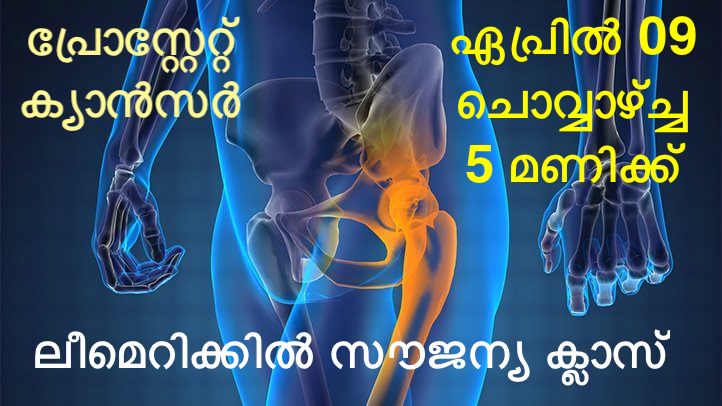പൊതുജനത്തിന് പ്രോസ്റ്റേറ്റ് ക്യാൻസറിനെ പറ്റി കൂടുതൽ വിവരങ്ങൾ പകർന്നുകൊടുക്കാൻ തയാറായി ലീമെറിക് യൂണിവേഴ്സിറ്റി ഹോസ്പിറ്റലും മിഡ്-വെസ്റ്റേൺ റേഡിയേഷൻ ഓൺകോളജി സെന്ററും ചേർന്ന് ഏപ്രിൽ 09 ചൊവ്വാഴ്ച്ച വൈകുന്നേരം 5 മണിക്ക് ഒരു സൗജന്യ ക്ലാസ് നടത്തുന്നു. താല്പര്യമുള്ള പൊതുജനത്തിന് ഇതിൽ പങ്കെടുക്കാം. ലീമെറിക്കിലെ റഹീനിലുള്ള സൗത്ത് കോർട്ട് ഹോട്ടലിൽ വച്ചായിരിക്കും സെമിനാർ നടക്കുക.
പ്രധാന പ്രാസംഗികർ:
Dr Nemeer Osman, Consultant Medical Oncologist, University Hospital Limerick
Dr Mazen El Bassiouni, Consultant Radiation Oncologist, Mid-Western Radiation Oncology Centre
Dr Jody Khan, Specialist Registrar in Urology, UL Hospitals Group
ലിമെറിക്ക് ഹോസ്പിറ്റൽ ഗ്രൂപ്പിന്റെ കീഴിലുള്ള ഹോസ്പിറ്റലുകളിൽ മാത്രം നിലവിൽ 300 ഓളം പുരുഷന്മാർ പ്രോസ്റ്റേറ്റ് ക്യാൻസറിന് ചികിത്സ നേടുന്നുണ്ട്. ഈ സാഹചര്യത്തിൽ പ്രോസ്റ്റേറ്റ് ക്യാൻസറിന്റെ വരും വരായ്കകളെക്കുറിച്ച് പൊതുജനത്തെ ബോധവാന്മാരാക്കുകയാണ് ഈ സെമിനാറിന്റെ ഉദ്ദേശ്യം.
അയർലണ്ടിൽ പ്രതിവർഷം 2,750 പുരുഷന്മാരിൽ പ്രോസ്റ്റേറ്റ് ക്യാൻസർ ഉള്ളതായി കണ്ടെത്തുന്നുണ്ട്. പുരുഷന്മാരിൽ ഉണ്ടാവുന്ന കാൻസറുകളിൽ 30 ശതമാനവും പ്രോസ്റ്റേറ്റ് ക്യാൻസർ ആണ്. 70 വയസ്സിൽ കൂടുതൽ ഉള്ളവരിലാണ് ഇത് കൂടുതലായി കാണുന്നത്. എന്നാൽ ഇതിന്റെ രോഗകാരണം വ്യക്തമല്ല. പ്രോസ്റ്റേറ്റ് ക്യാൻസർ വളരെ പതിയെ വ്യാപിക്കുന്നതുകൊണ്ടാണിത്. നേരത്തെ കണ്ടുപിടിച്ചാൽ മാത്രമേ പ്രോസ്റ്റേറ്റ് ക്യാൻസർ ചികിൽസിച്ച് മാറ്റാൻ പറ്റുകയുള്ളൂ.
അയർലണ്ടിൽ 500 ഓളം പേർ പ്രതിവർഷം പ്രോസ്റ്റേറ്റ് ക്യാൻസർ വന്ന് മരിക്കുന്നതായാണ് റിപ്പോർട്ട്.
രോഗ ലക്ഷണങ്ങൾ
- needing to urinate more frequently, often during the night
- needing to rush to the toilet
- difficulty in starting to urinate or pee (hesitancy)
- straining or taking a long time while urinating
- weak flow
- feeling that your bladder has not emptied fully.
രോഗ കാരണങ്ങൾ
- Age – the risk of prostate cancer rises with age, from about 50 years, and increases as you get older.
- Ethnic group – prostate cancer is more common among men of African-Caribbean and African descent. The condition is relatively rare among men of Asian and South and Central American descent.
- Family history – having a close male relative, such as a brother, father or uncle, who had prostate cancer seems to increase the risk of you developing prostate cancer. Research also shows that having a close female relative who developed breast cancer may also increase the risk of you developing the condition.
- Obesity, diet and exercise – recent research suggests that there may be a link between obesity and prostate cancer. Research is ongoing into the links between diet and prostate cancer. There is evidence that a diet high in calcium is linked to an increased risk of developing prostate cancer.





